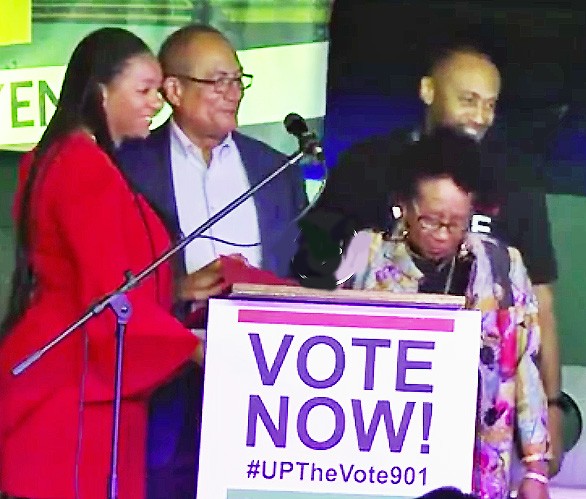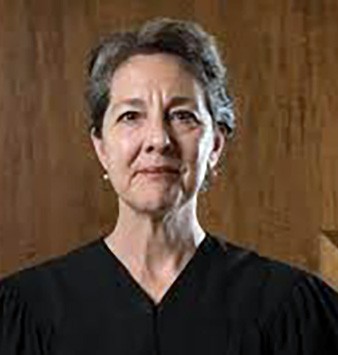
Stare Rep. London Lamar presents a citation (from Tenn. House Speaker Glen Casada, no less) honoring 1991 Peple’s Convention vets Shep Wilbun and state Rep. Barbar Cooper as Rev. Earle Fisher looks on
How did the People’s Convention of 2019, held at the Paradise Entertainment Center on Saturday, compare with the seminal People’s Convention of 1991 that launched the successful campaign of Willie Herenton, Memphis’ first elected black mayor? As an apple to an orange, though both were undertaken with the aim of expressing the will of what one of this year’s convention participants called a “marginalized” population.
The 1991 event drew roughly 2,000 participants to Cook Convention Center; this new one drew a smaller number. Estimates range from 200 to 600, depending on the extent of the estimator’s involvement with the event. The actual number of attendees at Paradise probably closer to the low end, but Internet logs of the event, which was streamed online, suggest a far larger cybernetic audience, maybe in the thousands.
Under the umbrella of the ad hoc group, Up the Vote 901, numerous organizations associated themselves with the 2019 event: AFSCME, Black Lives Matter, MiCAH, etc., an extensive land impressive list, and preliminary statements by spokespersons for these groups took up almost two hours of the five hours-plus that the event lasted. Shelby County Mayor Lee Harris was there to add his exhortation as was Mayor Frank Scott Jr. of Little Rock.
There was something of a collective organizing group, though two of the major figures were the Rev. Earle Fisher and Sijuwola Crawford. Unmistakably, Shelby County Commissioner Tami Sawyer was a booster of the convention and was boosted by it in return, to the point that other major candidates — notably Mayor Jim Strickland and former Mayor Herenton — kept their distance.
To note the more sectarian and limited nature of the 2019 convention, as compared to the 1991 original, which arguably spoke to Memphis’ aspiring black population per se, is not to downgrade it, however. This year’s convention drew inspiration and cadres from such earlier grassroots expressions as the Bridge confrontation of 2016 and the Take “em Down 901 campaign against the city’s Confederate statuaries.
The agenda for the People’s Convention of 2019 included attention to a diverse set of issues — including housing, education, public health job creation, justice reform, and voting equity — but its overtly political aims were to endorse candidates willing to “align” themselves with those aims. Candidate response was somewhat uneven and it remains to be seen how well those who responded to the convention call do in October, and what sort of groundswell can be generated between now and then.
Municipal Court Judge Jayne Chandler, the one candidate present who was enjoined by the Judicial Canon of Ethics to avoid overtly political statements, managed to circumvent that prohibition with some appropriately forceful — and clearly permissible — rally cries:
“‘Wait’ almost always translates to Never!” “They used to feed you chicken and watermelon. Now they feed you crawfish!” (That was a reference to the crawfish fest held by opponent David Pool on the previous weekend.) “I’m not going in reverse anymore.” (That was a reference to Chandler’s response for circumventing a transmission issue, and it made a nifty metaphor.)
The judge was the second of several candidates who appeared as the only participating representatives from their particular election contest (or who, in the jargon of the event, were there to “align” their candidacies with the convention agenda). And she was the first to be acknowledged as a “consensus” choice of those voting.
At that stage of things, the number of people voting electronically (including those present as well as those streaming the event online) had to reach a ceiling of 200 to achieve viability for the outcome. Chandler made the cut, whereas the first hopeful appearing solo, city court clerk candidate Demeatree Givens, had apparently not.
It was hard to tell whether Givens had been adjudged to have fallen short of approval or had been victimized by gremlins in the electronics of voting, carried out via the prescribed website, Menti.com. In any case, the threshold of 200 votes cast was adhered to through the first several candidate rounds but was allowed to dip to 120 by the end of the event, which was in its sixth hour by the time of a culminating vote for a mayoral candidate.
In any event, several candidates would meanwhile get the convention nod — two of whom, Orange Mound activist Britney Thornton for the District 4 seat; Theryn Bond in District 6 — were the sole candidates appearing, but both of whom gave good accounts of themselves.
There were actual contests for successive positions. The District 7 contest would see several aspirants on stage: Michahalyn Easter Thomas, Thurston Smith, Will “the Underdog” Richardson, and Larry Springfield. This was a spirited colloquy, with Thomas and Smith sounding notes of populism and Smith boasting his entrepreneurial know-how and Springfield stressing his personality. Thomas would get the nod.
At this point, heading into the consideration of candidates for super-district city council seats and mayoral hopefuls, time was made for a segment honoring two veterans of the original People’s Convention of 1991, the one that would nominate Willie Herenton as the consensus black candidate for mayor.
As it happens, Herenton, who went on to defeat then-incumbent Dick Hackett and serve 17 years as the city’s chief executive, is once again a candidate for mayor, but he was conspicuously absent from this year’s event. His name was invoked, however, by former Councilman, County Commissioner, and Juvenile Court Clerk Shep Wilbun, one of the two first Peoples’ Convention vets being honored. Besides being one of the original organizers of the 1991 event, Wilbun had been an aspirant for the mayoral role himself back then, and he would cite Herenton’s victory at that convention as proof of the objectivity of that event and as a precedent for that of the current one, which, as Wilbun knew, had been widely rumored to be a “setup” for mayoral candidate Tami Sawyer.
The other honoree from 1991, 90-year-old state Representative Barbara Cooper, recalled for the audience her lifetime of “40 years of segregation and 40 years of integration” and drew implicit parallels between the two conventions. In one particular, though, Cooper was at variance with the spirit of the current convention.
Several convention participants, including members of collaborating organizations and some of the candidates for office, had made a point of extolling Ranked Choice Voting (also known as Instant Runoff Voting), a method of balloting that allowed voters to rank candidates for office in order of preference, creating thereby a means for re-assigning the secondary preferences to reach a majority verdict in cases where, on first balloting, none had existed.
RCV has been approved by Shelby County voters twice but has been resisted by incumbents on the current city council, who, along with state election officials, have been able to delay its planned implementation in the forthcoming city election.The method was implicitly regarded as akin to the other progressive elements of the 2019 People’s Convention agenda and in addition to the other testifiers, a figure in the RCV movement, Aaron Fowles, had been included in the original lineup of co-sponsors allowed to address the convention.
But Cooper, in her somewhat rambling remarks to the crowd, made it clear that she had bought into a contrary theory advanced by RCV opponents that the method would run averse to the interests of the city’s current black voting majority. “IRV may be good for a minority but I’m not a minority,” Cooper said.
It was a break in the texture of things — a generational one, as clear and obvious as was Herenton’s absence from this would-be re-do of his 1991 triumph, and a deviation from populist idealism in the direction of imagined self-interest — whether a confirmation or rejection of Wilbun’s claim that the two conventions shared “the same agenda,” it was hard to say.
This moment for the elders was followed by a trio of contenders for the Super-District 8, Position 1 seat — educator Nicole Clayburn, lawyer J.B. Smiley, and Whitehaven activist Pearl Eva Walker, the ultimate endorsee. Each was asked to opine on RCV, and each responded without ambiguity: The people had spoken for the process in two referenda, and it — and they — needed to be heeded.
The convention was back on message and would stay that way — through effective solo presentations by Frank Johnson, candidate for Super District 8, Position 2, and Erika Sugarmon, candidate for Super District 9, Position 1.
The stage was set for the two mayoral candidates present — the aforementioned Sawyer and LeMichael Wilson, an unsung but hard-working mayoral entry who in his turn would cover the waterfront of social issues and inner-city concerns.
But it was Sawyer’s day, though she had to wait for hours to claim her moment before a somewhat diminished crowd. In the five minutes allotted to her, Sawyer noted that in the 200 years of its history, Memphis had never had a woman as mayor. Sensing that she was well enough known to avoid having to recount all her activist deeds of the last few years, notably including her spearheading of community efforts to dispose of Memphis’ Confederate monuments, she talked about the need to redistribute the city’s resources “to all neighborhoods” and scorned Strickland for what she said were inadequate efforts on behalf of the whole Memphis population.
She promised to do something concrete about the “school-to-prison pipeline” and to up the percentage of blacks and women benefited by the city’s ongoing MWBE (Minority and Women’s Business Enterprise) efforts.
As expected, Sawyer was named the consensus nominee for mayor by the convention, and by Sunday morning, an icon announcing her as the “winner” was a posted link on Facebook.
There is no disputing Sawyer’s determination, but neither is there any gainsaying the enormity of the task before her — a far greater one than confronted Herenton in 1991. The odds of her accomplishing the miracle of election in 2019 are beyond enormous, but at the very least she has established a head start in community consciousness that could pay dividends in 2023, when Strickland would be term-limited and such other likely candidates as current Shelby County Commission Chairman Van Turner will be making their move.


